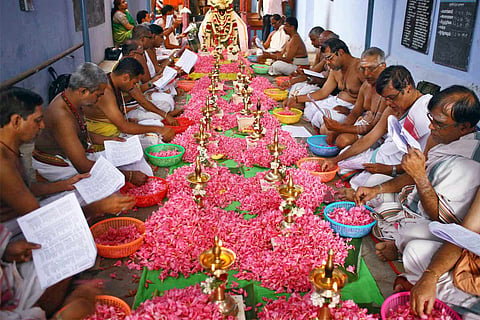

The Karnataka government has no plans to bring in legislation to appoint non-Brahmins as priests in temples, the Minister for Muzrai Kota Srinivas Poojary said. This was in response to a question raised by Congress leader RB Timmapur in the Karnataka Assembly. In Karnataka, there are over 34,000 temples under the Muzrai department.
To a question asking if the Karnataka government intends to appoint priests from the Scheduled Castes and Tribes in temples under the Muzrai department, the minister responded in the negative. The minister further elaborated that the non-hereditary priests and temple employees will be appointed as per section 12(1) of the Karnataka Hindu Religious Institutions and Charitable Endowments 2002.
The Tamil Nadu government, in June 2021 had announced that Hindus of all castes will be appointed as priests in over 36,000 temples under Hindu Religious and Charitable Endowments Department (HR&CE). In 2017, for the first time ever, the Kerala Devaswom Recruitment Board conducted written tests and interviews to fill the position of priests in temples under the state government. This paved the way for the appointment of 36 non-Brahmins, six of whom were from Dalit communities in October of the same year.
The ruling BJP in Karnataka defended their decision to not follow in the footsteps of neighbouring states. Speaking to TNM, a spokesperson for BJP Karnataka said that the state’s temples do not discriminate based on caste while appointing priests and thus a separate law to include non-Brahmins is not required.
“The state government does not have any such proposals. There are non-Brahmins also working as archakas for a long time. In north Karnataka, they do not have Brahmins as archakas in many places, people from other castes also are allowed as priests,” said S Prakash. “Tamil Nadu has a different social fabric. It is an old thing in Karnataka so no rule is needed for legislation. There is no bar. If somebody wants to become a priest, they are most welcome. Why should the government decide? It is according to the interest of the person,” he added.
The premise put forth by the BJP spokesperson was contested by S Balan, a Karnataka High Court advocate. Speaking to TNM, he said that a law to include priests from all castes is definitely required in the state. He said that not doing so is a violation of Article 17 of the Constitution which prohibits untouchability in any form, Article 14 says all are equal before the law, and Article 25 which speaks of freedom of faith.
“All temples are under the Muzrai department of the government. And any Hindu whether he is from the Dalit community, Backward Class, Brahmin, Kshatriya, Vaishya or Chandala is entitled to be a priest. Temples have been controlled by Brahmins for 3,000 years. The welfare state should intervene as per social justice,” Balan told TNM.
He added that to correct the historical inequalities, the state which is the custodian of rights should step in to protect the marginalised communities. “As long as it is a government temple and not a community temple it should be applied. Manu Smriti denies access to Dalits and Shudras in the sanctum sanctorum of any temple. But if you want to implement the constitution, as per the preamble of the constitution, justice should be given to all. A Hindu and a devotee should be allowed to be a priest,” he said.